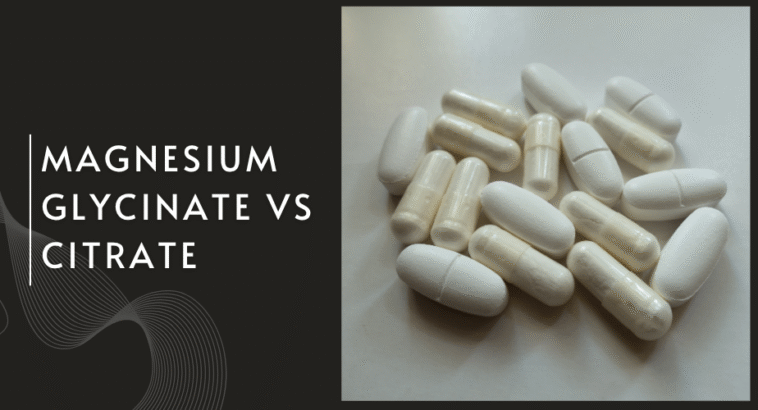Magnesium plays a crucial role in hundreds of bodily functions, including muscle and nerve activity, energy production, and bone health. Despite its importance, many people do not get enough magnesium through diet alone, which is where magnesium supplements like magnesium glycinate and magnesium citrate come into play. Comparing magnesium glycinate vs citrate offers valuable insights into their efficacy and role in daily wellness. Both supplements are among the most popular choices due to their absorption rates and targeted health benefits.
Modern diets often lack magnesium-rich foods, increasing reliance on supplements. Factors such as stress, digestive disorders, and certain medications may aggravate magnesium depletion, making supplementation a practical solution. When considering magnesium glycinate, it’s worth understanding who needs extra magnesium and what form could help optimize personal health outcomes.
Magnesium Glycinate vs Citrate: Key Differences Explained
Chemical Structure and How It Affects Your Body
The main keyword—magnesium glycinate—reflects distinct differences in structure. Magnesium glycinate is magnesium bound to glycine, an amino acid known for calming properties, whereas magnesium citrate consists of magnesium and citric acid. This structural variation influences both their absorption and effects in the body.
How Absorption Rates Differ
One key talking point in the magnesium glycinate debate is bioavailability. Magnesium glycinate is renowned for being gentle on the stomach and highly absorbable, making it an excellent choice for individuals seeking maximum benefit with minimal digestive upset. In contrast, magnesium citrate is still very well absorbed but is more likely to have a laxative effect.
Benefits of Magnesium Glycinate: Targeting Sleep, Anxiety, and More
Why Choose Magnesium Glycinate for Sleep and Stress?
Among magnesium glycinate benefits, support for restful sleep and relaxation stand out. Glycine, which is paired with magnesium, may help promote deeper sleep and reduce nighttime awakenings. As a result, many individuals with sleep difficulties or heightened stress levels favor magnesium glycinate, especially when a calming effect is desired.
Additional Health Benefits
In addition to sleep support, magnesium glycinate is valued for its potential in soothing anxiety, reducing muscle cramps, and supporting cardiovascular health. It is less likely to cause gastrointestinal issues, making this supplement a great option for daily use, particularly for those with sensitive stomachs or chronic stress concerns.
Advantages of Magnesium Citrate: Digestion and Energy Support
How Magnesium Citrate Promotes Digestive Health
When comparing magnesium glycinate, magnesium citrate is commonly chosen for its gentle laxative properties. This makes it helpful for individuals dealing with occasional constipation, as it works efficiently to regulate bowel movements without harsh side effects.
Supporting Energy Production and Muscle Function
Magnesium citrate is also frequently recommended for those seeking general energy support, as mag citrate plays a role in ATP production—fuel for every cell. Athletes and active individuals might prefer magnesium citrate due to its tendency to enhance muscle performance and expedite recovery from intense physical activities.
Bioavailability and Absorption: Which Is Superior?
Evaluating Magnesium Glycinate vs Citrate for Absorption Rate
When it comes to bioavailability—the body’s ability to absorb and utilize a supplement—magnesium glycinate often earns the spotlight. Due to its chelated form, magnesium glycinate is highly absorbable even for those with digestive challenges, rendering it effective and gentle on the stomach. Magnesium citrate is also considered highly bioavailable, but the difference lies in tolerance and targeted use.
How Your Body Responds: Tolerance and Uptake
The magnesium glycinate debate centers on tolerance. Individuals sensitive to laxative effects may fare better with magnesium glycinate, which is less likely to cause loose stools. In contrast, anyone needing mild constipation relief will likely benefit from magnesium citrate’s effects.
When to Choose Magnesium Glycinate: Special Scenarios
Magnesium Glycinate for Chronic Anxiety and Insomnia
Magnesium glycinate’s calming influence is widely sought by those experiencing high stress, chronic anxiety, or difficulty sleeping. Its unique glycine content promotes neurotransmitter balance, supporting sustained relaxation and deeper sleep cycles, making it ideal for stress-prone individuals comparing magnesium glycinate.
Use in Those With Sensitive Digestion
People with irritable bowels, or those prone to digestive sensitivities, often select magnesium glycinate because it minimizes the risk of diarrhea or digestive upset—a common issue with many other forms of magnesium, including magnesium citrate.
When Magnesium Citrate Makes Sense
Occasional Constipation or Cleansing Needs
Magnesium citrate’s standout trait is its mild laxative response. Those who struggle with infrequent bowel movements may find magnesium citrate more effective for digestive regularity when weighing magnesium glycinate.
General Health and Fitness Applications
For the physically active or those seeking to maintain general wellness, magnesium citrate can be a beneficial part of recovery, hydration, and muscle performance protocols. It’s a preferred supplement for those needing a value-oriented magnesium supplement that supports energy metabolism and muscle health.
Possible Side Effects: Magnesium Glycinate vs Citrate
Recognizing Potential Reactions
For the majority, both forms are safe when taken as directed. In the magnesium glycinate debate, magnesium glycinate is associated with fewer gastrointestinal side effects, whereas higher doses of magnesium citrate may sometimes lead to diarrhea or stomach cramping.
Who Should Exercise Caution?
Pregnant women, individuals with kidney disease, or those taking certain medications should consult a healthcare provider before adding any magnesium supplement to their routine. Monitoring intake and adjusting dosage can prevent unwanted side effects and maximize the benefits of magnesium glycinate or citrate.
Dosage, Timing, and How to Supplement Effectively
Understanding Optimal Dosage for Each Form
Correct dosing is crucial in the magnesium glycinate comparison. While general recommendations are around 200–400 mg of elemental magnesium daily, individual needs may differ. Magnesium glycinate’s high absorption often means smaller doses are effective, while magnesium citrate may be increased cautiously in cases of constipation.
Tips for Effective Supplementation
To get the most out of magnesium glycinate or citrate, consistency is key. Taking supplements with meals can enhance absorption and reduce digestive upset, and splitting doses throughout the day may further enhance tolerance for those with sensitive stomachs.
The Verdict: Magnesium Glycinate vs Citrate—Which Is Better for You?
Summing Up the Comparison
Choosing between magnesium glycinate depends largely on individual needs and health goals. Magnesium glycinate is optimal for those looking for sleep support, anxiety reduction, and gentle daily supplementation, while magnesium citrate stands out for digestive health, regularity, and energy support.
Practical Advice and Call to Action
Consider your primary reason for supplementation—do you need help sleeping, managing stress, or supporting muscle function? Or is digestive regularity your top priority? Whichever your focus, ensure you choose quality products and consult your healthcare provider if you have any health concerns. Magnesium glycinate—no matter which you choose, supplementing magnesium can be a valuable step toward improved wellness.




